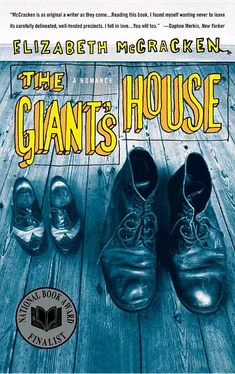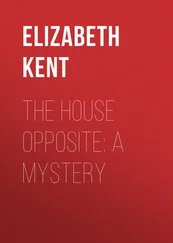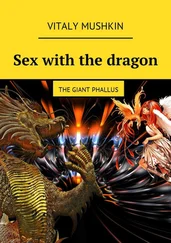“But for him, the growing.”
“They don’t know enough yet,” he said. “You could talk to one of the medical doctors, as I have, and they’ll tell you the same thing. There’s so much we don’t know.”
I thought about staying in Boston for a few days. My parents lived here; I could see them. I’d grown up in Boston, my childhood unfurnished by religion or siblings. My parents were frugal and did not even give me a middle name. My parents were in love with each other, and that is a blow that no child can recover from. I walked around the city of my youth for a while, suddenly a little nervous. I held on tight to my pocketbook.
Would they let me stay at the hospital, pull up a chair and nap, a vigil? Perhaps they only let you do that if the patient was about to die. But he was a boy in a bed — in two beds — in a big city, far from his family.
Still, I could not make myself ask anybody at the hospital, and I could not make myself call my parents, who, whenever I suggested a visit, made themselves sound busy. Now that I had moved out, I became just like any would-be visitor: an inconvenience not to be tolerated. They would happily meet me in a restaurant, and for a moment I thought I’d call and suggest that. But the last bus back to Hyannis was in an hour, and Oscar had already agreed to meet me, and so I went to the station, bought a magazine, and waited.
On the bus ride home, I faulted myself. I should have known to stay, I thought. I should not be a coward. My love for James until this day had always been troublesome. I didn’t think I was any good at it. No good at talking to people in general and sometimes him in particular. He could make me feel uncomfortable, because I did not always understand him. I did not understand myself when in his presence.
The rest of the world fell in love, and the physics baffled me. I could see it happen — God knows, all around, I saw falling couples — but I did not understand the emotional gravity that allowed their descent.
And then, like Newton, I felt it smack me over the head.
Those people had made a decision, and then they fell; they did not find themselves hip deep in love and wonder how they got there. For years I’d waited for someone to love me: that was the permission I needed to fall in love myself, as though I were a pin sunk deep in a purse, waiting for a magnet to prove me metal. When that did not happen, I’d thought of myself as unlovable .
But now, with James lonely in his hospital room, I realized that waiting like that was hopeless. I could wait forever and he might never know to love me back and I would live and then die with a tiny awful feeling that could have been love, had it ever seen light or oxygen.
Well, I’d change that. I would love him. It would be easy as keeping his gaze, easy as saying, This is what to do. I would perfect my love for him, never care what others thought of me, or even what he was thinking of me. It was this I’d waited for all my life: a love that would make me useful, a love that would occupy all my time.
Well, who cut you out? Caroline had said when I told her I wasn’t cut out for a boyfriend. I would, now; I would redesign myself.
I knew that day on the bus home that I was giving up things, old habits, future friends. That day I renounced everything, even my love for Caroline and Oscar — because I knew I would lose that; in certain ways I would now be at odds with them. I burned each of my possibilities in my head, those I recognized and those I didn’t.
Perhaps I was a princess from a fairy tale. Sometimes, when your lover does not step from the woods to save you — because how many of us are rescuable, how many would look at some fool in a pair of tights and a pageboy and say, Of course — sometimes you have to marry your tower, your tiny room. You must take great interest in everything, a spinning wheel, a perfect single bed, the sound of someone breathing on the other side of the door. Once I had thought that the library was my tower, but that wasn’t true. My love for James was the dark room I moved into that day.
It’s where I still live.
I did not love him like a brother. I did not love him like a son. And though I loved him because of his body, it wasn’t his body I loved, not the body of some man I dreamed would hold me, a body containing secrets that would somehow transform my own. Some will hear this and say, librarian, spinster: clearly there’s a block, clearly there are problems here. But I’ve thought about this enough, and I’ve dreamed of other men’s bodies that way, and I know the difference.
Perhaps it was because James’s body was unavailable, belonging to himself and no one else, or perhaps because, though I knew it, his body was still always unimaginable. Unimaginably that large, unimaginably refusing to stop, unimaginably killing him just with its growth.
I did not imagine.
I loved him in a way that I have never and will never love anyone ever again, in a way I suspect — Peggy, always greedy — few people love, or have been loved. I loved him because he was young and dying and needed me. I loved not only his height, but his careful way with any hobby, his earnestness, his strange sense of humor that always surprised me. I loved him because I wanted to save him, and because I could not. I loved him because I wanted to be enough for him, and I was not.
I loved him because I discovered that day, after years of practice, I had a talent for it.
When I was in college in Philadelphia, I had my first job in a library. I sat behind the reference desk late nights, after the librarians had gone home, and tried to help students. I wasn’t good at it yet. A library is an exosomatic memory — what they nowadays call an out-of-the-body experience, though I believe most experiences are. Books remember all the things you cannot contain. I didn’t understand that at first. I wanted to remember only facts, not how to reach them; I was a tourist who hated travel.
Afternoons, I trailed the librarians, trying to pick up tips. Some casually listed off names of sources the second a question was asked; they might not even stand up to talk to the patron. If the student still looked confused, the librarian would say, curtly, index . Impossible to tell whether there was any pleasure to it. Others loved every query. They were the ones who knew the most: not just facts — though they did — but the organization of every book, where you’d find bibliographies, where you’d turn up empty. They knew the subtlest treasures of national biographies and climatological tables and censuses.
I stayed at the job when I went to get my master’s. My memories of library science school — and they are fading, thankfully — are of an alphabetized wilderness. Book leaves flapping in the afternoon, fine dusty mists rising from them. Equatorial heat. The toes of a dozen pairs of sensible shoes squeaking beneath desks. The teacher passing out the syllabus, the room filled with the soft click of handheld hole-punchers, a three-syllabled call, then the shush of hands over desks scooping up paper dots.
Our professors told us that order was important. This is true; I love order. But they never explained why. Order was for order’s sake, they said, and the other students nodded seriously: for them precision was a religion taken up at late age that would keep you from sin and keep you from Hell and everybody who didn’t understand this was damned. Presumably, two years of graduate study was far cheaper than the psychoanalysis it would have taken to get over whatever it was their mothers had done to them.
But a library is a gorgeous language that you will never speak fluently. You will try every day of your life. Order is a certain clumsy grammar, a mnemonic device. Order just means: try to use verbs. Consider the tense. The poetry will follow.
Читать дальше












